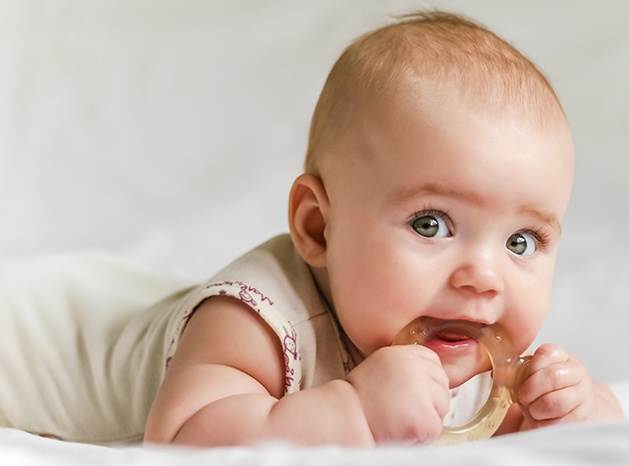Babies look cute when they start teething but for children themselves, this process is generally painful and bring variable discomfort during the few days before tooth eruption through the gum line. In every child, it could be different in terms of discomfort, like some babies are bothered more than others during the migration through the tissues deep to the gum line.
Although eruption is bit difficult phase for every tooth but because of their shape, molars are more likely to be associated with teething discomfort. Permanent teeth usually come between 6 to 12 years of age, and at that time, the roots of baby teeth degenerate, allowing their replacement with 32 permanent adult teeth. Many parents are worried about their baby’s teething since it comes always with other symptoms such as fever, fussiness, and diarrhea. Some parents used to think that fever, fussiness, and/or nasal congestion with cough and diarrhea are due to teething but this is not always the case. These symptoms can be there due to other reasons such as viral infections, so it’s important to contact a doctor if these or other symptoms seem concerning. It’s not recommended to assume simply that they are just from teething.
Another important thing is to wipe your baby’s gum with gauze or a soft wet wash cloth during bath time, even before you can see your baby’s first tooth. The most popular way to do so is to wrap the gauze or washcloth around your index finger and rub gently over your baby’s gums. Remember, babies have the same mechanism of develop bacteria in their mouth, although bacteria in the mouth usually can’t harm the gums before the baby teeth emerge, but you never know exactly when the teeth are starting to push through, so it’s good to do early. It’s very basic habit that your baby have to learn.

How Long does it Last when Teething Starts in Babies
If your baby is in the process of teething and you want to know more about it, then continue reading.
When do babies start Teething
It varies from baby to baby but generally baby’s first tooth generally emerges any time between the first five to seven months of their life. It’s nothing to worry about, if your child cut their first tooth before the age of five months or still be toothless until after their first birthday. By the time your child is celebrating his third birthday, he or she will likely to eat birthday cake with his or her milk teeth.
How long does teething last
This is also something that can’t be said firmly, that how long it will take for a tooth to make its way through the gum. It has been seen in some babies that they are unsettled and unhappy for only a few days before a tooth emerge, while in some others, it may take really long. Generally the first teeth is difficult one and you may have breathed a sigh of relief but another difficult time around the age of one is there to come so be ready for some other tough days when their molars come through. Molars can cause significant discomfort and pain because they are situated at the back of the mouth and are the largest of all the teeth.
Symptoms of Teething
Like all other things related to teething, the range of symptoms and their severity also varies between babies. Most common symptoms include:
- Swollen red gums
- Flushed red cheeks
- Excessive drooling
- Biting, rubbing or sucking the gums
- Reluctance to feed
- Mild fever
How do I care for my baby’s new teeth
To take care of your baby’s new teeth is a process that starts even the eruption of very first tooth in your baby’s mouth. Generally this process can be categorized in three steps like before eruption, when they come out a little and when teeth are fully developed in your child’s mouth, so every step needs your attention.
Parents with small babies might noticed it that teething infants often feel better when gentle pressure is placed on their gums. Due to this, doctors recommend gently rubbing the gums with a clean finger or having the child bite down on a clean washcloth. This process may last bit longer , but if the pain seems to be causing feeding problems, a different shaped nipple or use of a cup may help in this situation.
Another remedy that may help is cold object as they can reduce the inflammation. Frozen washcloths and ice cubes are widely used for this purpose. Prolonged contact of very cold objects on the gums is not recommended. When tooth or all teeth are there and you are wondering how you can take care of your baby new teeth, then oral hygiene is the first thing that should be started.
When your baby’s teeth are fully developed then never forget to use fluoride since it has been shown to be extremely effective in reducing the development and severity of cavities. But be careful, fluoride amounts vary by water source, so it’s good to check with the child’s pediatrician or dentist with headgear braces regarding any supplementation that may be necessary.


